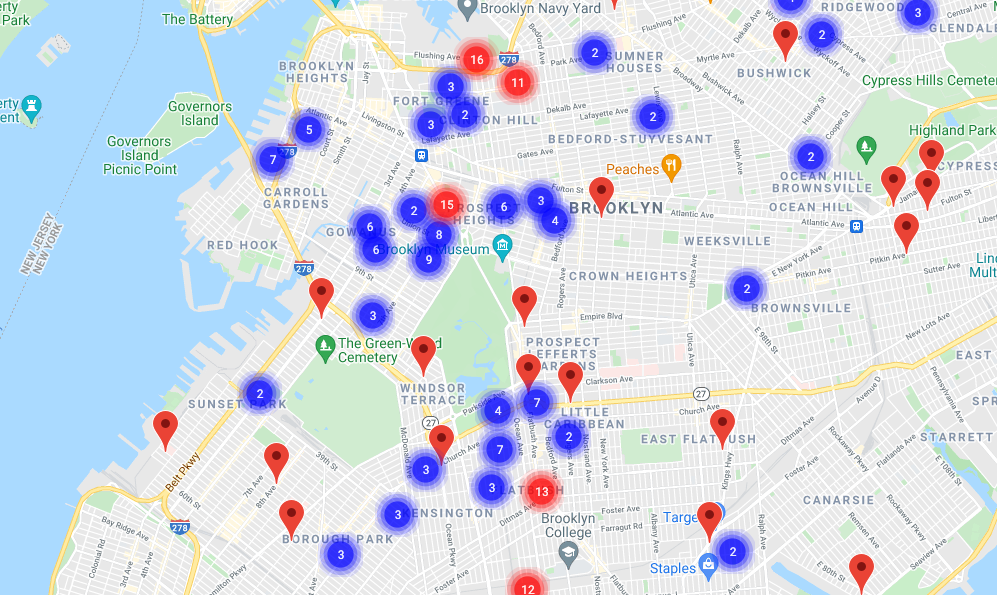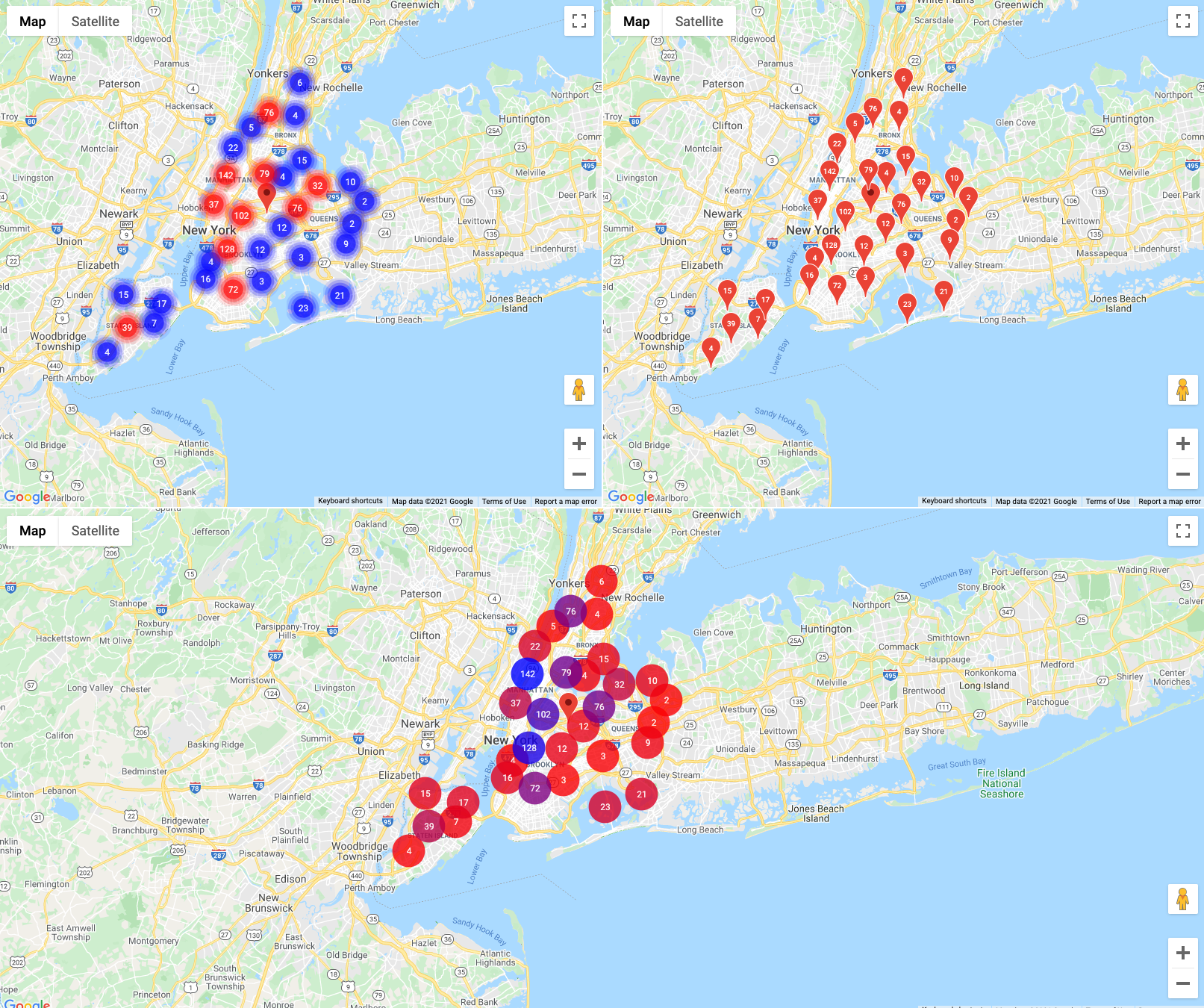
Security News
Fluent Assertions Faces Backlash After Abandoning Open Source Licensing
Fluent Assertions is facing backlash after dropping the Apache license for a commercial model, leaving users blindsided and questioning contributor rights.
@googlemaps/markerclusterer
Advanced tools
Creates and manages per-zoom-level clusters for large amounts of markers.
@googlemaps/markerclusterer is an npm package that provides functionality for clustering a large number of markers on a Google Map. This helps in improving the performance and user experience by grouping nearby markers into clusters, which can be expanded to show individual markers as the user zooms in.
Basic Marker Clustering
This feature allows you to create a basic marker clusterer on a Google Map. You initialize the map, create an array of markers, and then use the MarkerClusterer to cluster these markers.
const map = new google.maps.Map(document.getElementById('map'), {
center: { lat: -28.024, lng: 140.887 },
zoom: 4,
});
const markers = locations.map((location, i) => {
return new google.maps.Marker({
position: location,
});
});
new MarkerClusterer({
markers,
map
});Custom Cluster Icons
This feature allows you to customize the icons used for clusters. You can specify a custom renderer function that returns a marker with a custom icon and label.
const map = new google.maps.Map(document.getElementById('map'), {
center: { lat: -28.024, lng: 140.887 },
zoom: 4,
});
const markers = locations.map((location, i) => {
return new google.maps.Marker({
position: location,
});
});
new MarkerClusterer({
markers,
map,
renderer: {
render: ({ count, position }) => {
return new google.maps.Marker({
position,
label: String(count),
icon: {
url: 'path/to/custom/icon.png',
scaledSize: new google.maps.Size(50, 50)
}
});
}
}
});Cluster Click Event
This feature allows you to add an event listener for cluster clicks. When a cluster is clicked, you can access the markers within that cluster and perform custom actions.
const map = new google.maps.Map(document.getElementById('map'), {
center: { lat: -28.024, lng: 140.887 },
zoom: 4,
});
const markers = locations.map((location, i) => {
return new google.maps.Marker({
position: location,
});
});
const markerCluster = new MarkerClusterer({
markers,
map
});
markerCluster.addListener('clusterclick', (cluster) => {
const markers = cluster.getMarkers();
console.log('Cluster clicked:', markers);
});leaflet.markercluster is a popular plugin for the Leaflet library that provides similar functionality for clustering markers on a map. It offers a variety of customization options and is widely used in the Leaflet community. Compared to @googlemaps/markerclusterer, it is designed specifically for Leaflet maps rather than Google Maps.
supercluster is a fast, geospatial point clustering library for browsers and Node. It is highly efficient and can handle large datasets. Unlike @googlemaps/markerclusterer, supercluster is not tied to any specific mapping library and can be used with various mapping solutions.
The library creates and manages per-zoom-level clusters for large amounts of markers.

See the history section and migration section for how this library relates to @google/markerclusterer and @googlemaps/markerclustererplus.
Available via npm as the package @googlemaps/markerclusterer.
npm i @googlemaps/markerclusterer
Alternativly you may add the umd package directly to the html document using the unpkg link.
<script src="https://unpkg.com/@googlemaps/markerclusterer/dist/index.min.js"></script>
When adding via unpkg, the MarkerClusterer can be accessed at markerClusterer.MarkerClusterer.
This library uses the official TypeScript typings for Google Maps Platform, @types/google.maps.
npm i -D @types/google.maps
The reference documentation is generated from the TypeScript definitions.
import { MarkerClusterer } from "@googlemaps/markerclusterer";
// use default algorithm and renderer
const markerCluster = new MarkerClusterer({ map, markers });
View the package in action:
Algorithm Comparisons - This example demonstrates the different algorithms. Please note that spacing and many other options can be changed for each algorithm.
Renderer Usage - This example demonstrates different renderers similar to the image below.

This library has a heritage in @google/markerclusterer and @googlemaps/markerclustererplus, originally made available on code.google.com and then transferred to GitHub at https://github.com/googlemaps/v3-utility-library. The following is an approximate timeline.
The API of @googlemaps/markerclusterer has changed in a number of ways from @googlemaps/markerclustererplus.
MarkerClusterer class now accepts an algorithm and renderer parameter to allow for more flexibility. The interface looks like the following:{
algorithm?: Algorithm;
map?: google.maps.Map;
markers?: google.maps.Marker[];
renderer?: Renderer;
onClusterClick?: onClusterClickHandler;
}
MarkerClusterer accepts a single options argument instead of positional parameters.GridAlgorithm is still supported, but is not the default. The default is supercluster which uses k-d trees for improved performance.MarkerClusterer class is still an instance of google.maps.OverlayView, but uses google.maps.Markers instead of google.maps.Overlay to render the clusters. This solves issues related to the usage of map panes and click handlers.FAQs
Creates and manages per-zoom-level clusters for large amounts of markers.
We found that @googlemaps/markerclusterer demonstrated a healthy version release cadence and project activity because the last version was released less than a year ago. It has 2 open source maintainers collaborating on the project.
Did you know?

Socket for GitHub automatically highlights issues in each pull request and monitors the health of all your open source dependencies. Discover the contents of your packages and block harmful activity before you install or update your dependencies.

Security News
Fluent Assertions is facing backlash after dropping the Apache license for a commercial model, leaving users blindsided and questioning contributor rights.

Research
Security News
Socket researchers uncover the risks of a malicious Python package targeting Discord developers.

Security News
The UK is proposing a bold ban on ransomware payments by public entities to disrupt cybercrime, protect critical services, and lead global cybersecurity efforts.